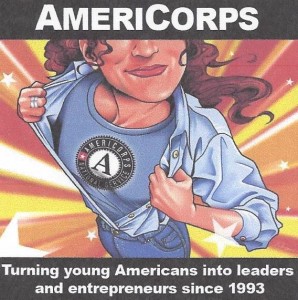Act 3 – Scene 3: The Neighborhood Bank
Act Three/Scene Three of A Complex Apology: The Neighborhood Bank
SCENE THREE: The idea for a “neighborhood bank” came about incrementally. After a couple neighbors started borrowing Joy’s electric lawn mower, the block club made a decision to purchase as a neighborhood four electric lawn mowers so everyone could quit using their gas mowers. The money raised from selling off the old mowers was donated to The American Federation for the Blind. Mr. Hartwell – now the oldest person on the block after the passing of Mr. Henderson – no longer used his garage and volunteered to store the four new mowers in return for one of the neighborhood kids mowing his lawn. Eventually the block club saw the advantage of sharing other things besides lawn mowers, and reduced their per capita expenses, by purchasing together (and storing in the Hartwell garage) a power saw, a long extension ladder, two snow rakes, and so on, for everyone’s use.
The next big idea was buying a very large freezer that took up one whole side of Hartwell’s garage, and buying meat and other groceries in bulk from a CSA in Wisconsin. CSA stands for Community Supported Agriculture – organic farmers who take orders early in the year, grow or raise what’s ordered, and then make regular deliveries throughout the year. Not only did those who joined save money, they also saved time on less trips to the grocery store. Best of all, they found that free-range chickens tasted better! (And tomatoes didn’t have to be hard as rocks.) Meanwhile, a community garden sprung-up, and within a couple years, the neighborhood was growing its own tomatoes rather than buying them from the CSA.
The tough part was keeping track of who grew the tomatoes, who wanted tomatoes, who ordered the beef and who didn’t, and who mowed whose lawn, etc. This led to the establishment of “the neighborhood bank” which started simply as a sign-in / sign-out sheet in the Hartwell garage, then became a ledger book where you could note “credits” for your contributions and your “debits” as you advantaged the free lawn mowing, etc. All of which led to a part-time job (earning credits) for Joy who oversaw the after-school recreation program and collected real money from the parents whose kids no longer went to child care (and now, instead, were in the rec program).
“The bank” disbursed money to the teenagers who ran the rec activities (and/or were mowing lawns, etc.), and there was a monthly accounting of who still had credits coming for some future services. At the time the Bad News arrived, the block club had just begun a tithing program from the per capita savings and was seriously exploring expanding “the bank” into a self-insurance line and a “crowd-sourced” loan outfit. Solar roof collectors were on the list of things to buy that save money. Of course, little of this would have been possible without everyone having total faith in Joy and total trust in her honesty. (Actually none of this would have been possible except that Fred the Doctor made good money and Joy could be a stay-at-home mom.) Harmony in all ways.
Tomorrow: Scene Four

